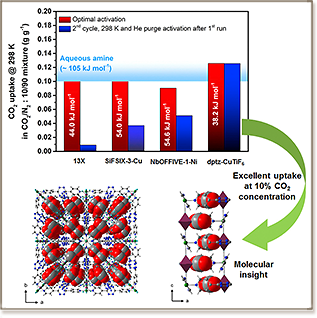
Increasing amounts of atmospheric CO2 by the combustion of fossil fuels prompt a notable temperature change along with other environmental issues. In parallel with the development of renewable energy technologies, new processes and materials for effective and energy-efficient CO2 capture are urgently coveted. By applying the interpenetration strategy, a newly developed microporous fluorinated metal-organic framework, dptz-CuTiF6, achieves superior CO2 uptake capacity and significantly lower regeneration energy than the reference aqueous amine technology. The exceptional CO2adsorption performance can be rationalized by the optimal CO2 packing within the framework and the cooperative host-guest interactions.


